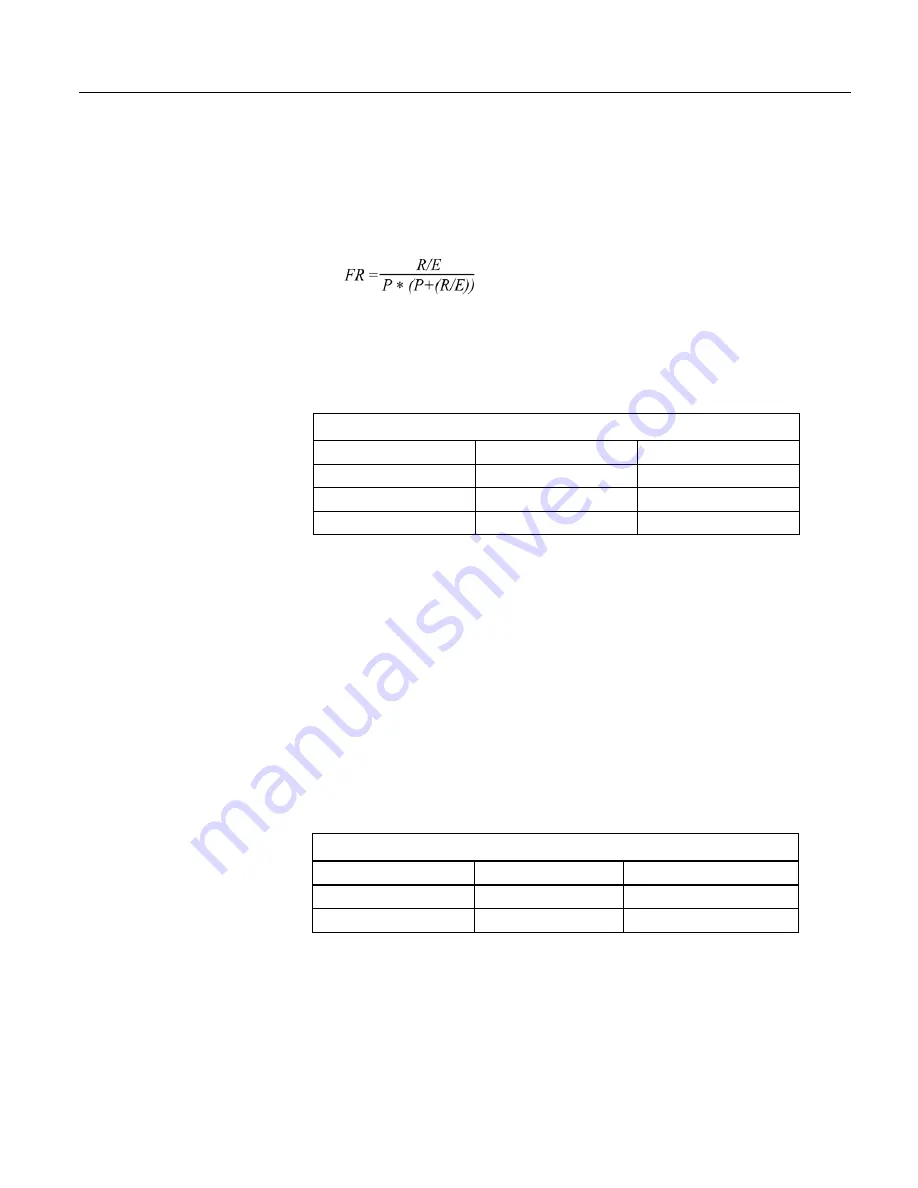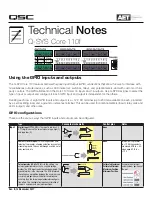
Section 8. Operation
where
FR = resolution of the frequency measurement (Hz)
S = scan interval of CRBasic program
Resolution of a frequency measurement made with the
TimerIO()
instruction is
where
FR = frequency resolution of the measurement (Hz)
R = timing resolution of the
TimerIO()
measurement = 540 ns
P = period of input signal (seconds). For example, P = 1 / 1000 Hz = 0.001 s
E = Number of rising edges per scan or 1, whichever is greater.
Table 77.
Example. E for a 10 Hz input signal
Scan
Rising Edge / Scan
E
5.0
50
50
0.5
5
5
0.05
0.5
1
TimerIO()
instruction measur
es frequencies of ≤ 1 kHz with higher frequency
resolution over short (sub-second) intervals. In contrast, sub-second frequency
measurement with
PulseCount()
produce measurements of lower resolution.
Consider a 1 kHz input. Table
Frequency Resolution Comparison
(p. 354)
lists
frequency resolution to be expected for a 1 kHz signal measured by
TimerIO()
and
PulseCount()
at 0.5 s and 5.0 s scan intervals.
Increasing a measurement interval from 1 s to 10 s, either by increasing the scan
interval (when using
PulseCount()
) or by averaging (when using
PulseCount()
or
TimerIO()
), improves the resulting frequency resolution from 1 Hz to 0.1 Hz.
Averaging can be accomplished by the
Average()
,
AvgRun()
, and
AvgSpa()
instructions. Also,
PulseCount()
has the option of entering a number greater than
1
in the
POption
parameter. Doing so enters an averaging interval in milliseconds
for a direct running-average computation. However, use caution when averaging.
Averaging of any measurement reduces the certainty that the result truly
represents a real aspect of the phenomenon being measured.
Table 78.
Frequency Resolution Comparison
0.5 s Scan
5.0 s Scan
PulseCount()
,
POption
=
1
FR = 2 Hz
FR = 0.2 Hz
TimerIO()
,
Function
=
2
FR = 0.0011 Hz
FR = 0.00011 Hz
8.1.3.3.2 Frequency Measurement Q & A
Q
: When more than one pulse is in a scan interval, what does
TimerIO()
return
when configured for a frequency measurement? Does it average the measured
periods and compute the frequency from that (f = 1/T)? For example,
Scan
(50,mSec,10,0)
TimerIO
(WindSpd(),11111111,00022000,60,Sec)
354
Summary of Contents for CR1000
Page 2: ......
Page 4: ......
Page 6: ......
Page 32: ......
Page 36: ......
Page 38: ......
Page 40: ......
Page 60: ...Section 4 System Quickstart Figure 16 PC200W View Line Graph 60 ...
Page 96: ......
Page 98: ...98 ...
Page 302: ......
Page 453: ...Section 8 Operation Figure 115 Using the Keyboard Display 453 ...
Page 456: ...Section 8 Operation Figure 118 Real Time Custom 456 ...
Page 457: ...Section 8 Operation 8 8 1 3 Final Memory Tables Figure 119 Final Memory Tables 457 ...
Page 458: ...Section 8 Operation 8 8 2 Run Stop Program Figure 120 Run Stop Program 458 ...
Page 460: ...Section 8 Operation Figure 122 File Edit 460 ...
Page 461: ...Section 8 Operation 8 8 4 PCCard Memory Card Display Figure 123 PCCard CF Card Display 461 ...
Page 478: ......
Page 506: ......
Page 536: ......
Page 636: ......
Page 642: ......
Page 644: ......
Page 676: ......
Page 677: ......
















































